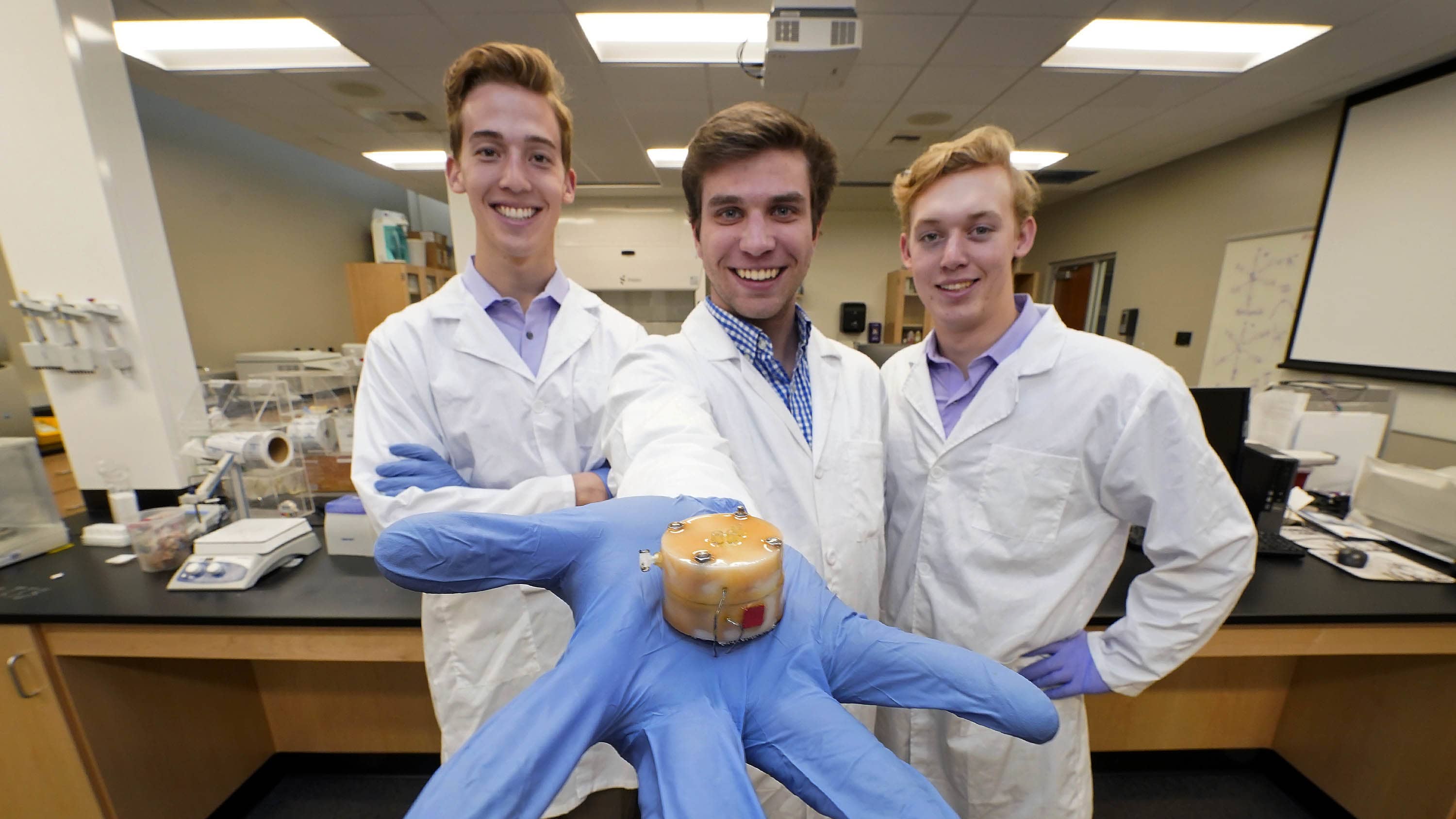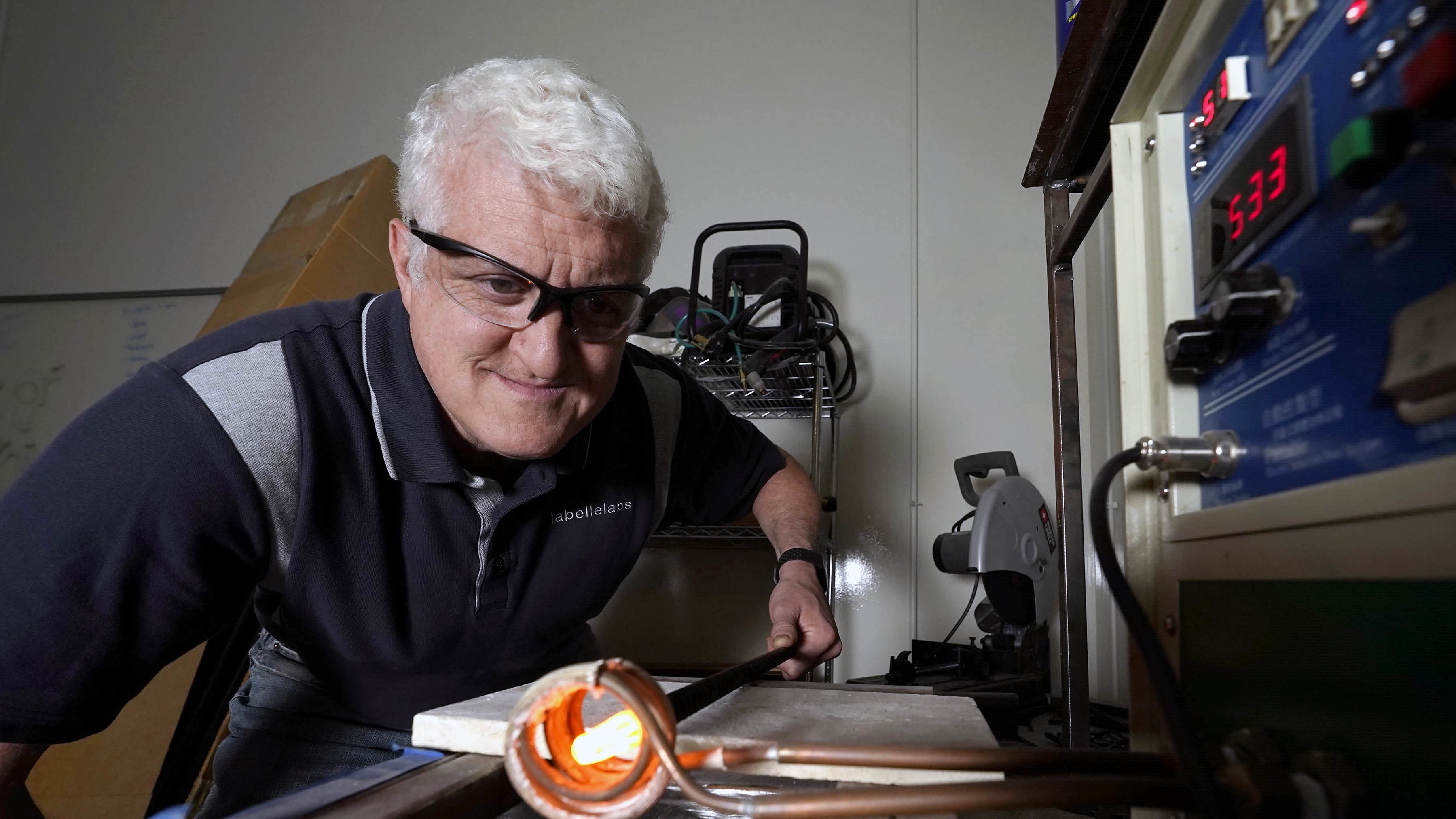Engineering Degrees
Engineers build the future through invention, discovery and exploration. The College of Engineering and Technology at GCU can prepare engineers who understand the value of working with diverse professionals to push the envelope of what’s possible.
Let Your Passion for Innovation Fuel Your Future
As of Fall 2022, GCU's 162,653 square foot engineering building offers a variety of hands-on experiences to its students via 21 labs that are paired with their scheduled classes and an additional nine labs that can be used by students outside of class time.
Loading Form
Engineering is the most common undergraduate degree of Fortune 500 CEOs.3
At GCU, engineering students can begin using professional-grade lab machines on day one.
Explore Degrees in Engineering for Various Industries
If you’re interested in pursuing a different project within your field and expanding your expertise in other engineering disciplines, it’s time to use your passion for engineering to help fuel your career.
According to the U.S Bureau of Labor Statistics, 11,600 new jobs are estimated to open for architecture and engineering occupations from 2023 to 2033.4 GCU’s degrees for engineering can help prepare you to work in many disciplines like computer, electrical, mechanical or industrial engineering.

GCU has achieved full and continuous accreditation by the Higher Learning Commission (HLC) since 1968. The high criteria and standards set by the HLC offer GCU graduates receive a quality education.
Programs accredited by the Engineering Technology Accreditation Commission (ABET) at GCU can help prepare graduates to meet global specifications while using their technical education to help others. Graduates have the opportunity to emerge as engineers who lead in innovation and become servant leaders across all technical fields.
The various engineering programs are designed to meet the needs of working professionals. Most GCU engineering majors are offered on campus, while our MS in Software Engineering is offered online. Conveniently scheduled online coursework allows you to work toward earning your degree while maintaining a busy schedule.

As a private Christian university, GCU is committed to keeping our engineering programs affordable to all students. Investing in your future is a big financial decision, which is why we offer several tools to help you estimate the cost of financing your bachelor’s or master’s degree in engineering.
Types of Engineering Degrees at GCU
We offer a variety of specializations and emphases to provide you with career-specific knowledge, such as electrical, biomedical, mechanical and robotics. In Fall 2023, 19,705 (78%) GCU campus students were enrolled in STEM or business-related programs.5
Employers often place emphasis on industry-specific and technical skills taught within engineering degree programs that can help solve complex real-life challenges.6 If building the future through invention, discovery and exploration excites you, a career in engineering may be right for you.
Bachelor’s Degrees
Bachelor's students are offered an opportunity to delve into a variety of engineering disciplines, allowing students to uncover the vast array of opportunities available in this innovative field of study.

Loading Degree Programs
Master’s Degrees
Explore advanced engineering studies and innovation with our master’s in software engineering program, designed to elevate your skills across diverse specializations.

Loading Degree Programs
Certificate Programs
Our specialized certificate programs offer focused study paths to help you enhance your engineering expertise and prepare you for professional challenges in the field.

Engineering Career Paths To Consider After Graduation
Explore various career avenues in engineering, each offering opportunities for professional growth and development. From aerospace engineering to renewable energy, the field encompasses diverse sectors where your skills can be applied. Consider your interests and strengths to pave the way for your career journey in engineering.

Frequently Asked Questions
If you’re trying to decide which engineering degree to pursue, we’ve gathered a few frequently asked questions to help you determine your education and career path.
1 The earnings referenced were reported by the U.S. Bureau of Labor Statistics (BLS), Mechanical Engineers as of May 2023, retrieved on Oct. 17, 2024. Due to COVID-19, data from 2020 to 2023 may be atypical compared to prior years. BLS calculates the median using salaries of workers nationwide with varying levels of education and experience. It does not reflect the earnings of GCU graduates as mechanical engineers, nor does it reflect the earnings of workers in one city or region of the country or a typical entry-level salary. Median income is the statistical midpoint for the range of salaries in a specific occupation. It represents what you would earn if you were paid more money than half the workers in an occupation, and less than half the workers in an occupation. It may give you a basis to estimate what you might earn at some point if you enter this career. Grand Canyon University can make no guarantees on individual graduates’ salaries. Your employability will be determined by numerous factors over which GCU has no control, such as the employer the graduate chooses to apply to, the graduate’s experience level, individual characteristics, skills, etc. against a pool of candidates.
2 The earnings referenced were reported by the U.S. Bureau of Labor Statistics (BLS), Architectural and Engineering Managers as of May 2023, retrieved on Oct. 17, 2024. Due to COVID-19, data from 2020 to 2023 may be atypical compared to prior years. BLS calculates the median using salaries of workers nationwide with varying levels of education and experience. It does not reflect the earnings of GCU graduates as architectural and engineering managers, nor does it reflect the earnings of workers in one city or region of the country or a typical entry-level salary. Median income is the statistical midpoint for the range of salaries in a specific occupation. It represents what you would earn if you were paid more money than half the workers in an occupation, and less than half the workers in an occupation. It may give you a basis to estimate what you might earn at some point if you enter this career. Grand Canyon University can make no guarantees on individual graduates’ salaries. Your employability will be determined by numerous factors over which GCU has no control, such as the employer the graduate chooses to apply to, the graduate’s experience level, individual characteristics, skills, etc. against a pool of candidates.
3 Macosko, J. and Ewert, W. (2024, Sept. 17). Which Colleges and Universities Have the Most Alumni Who Are CEO’s of Fortune 500 Companies? Academic Influence. Retrieved April 1, 2024.
4 COVID-19 has adversely affected the global economy and data from 2020 to 2023 may be atypical compared to prior years. Accordingly, data shown is effective Aug. 29, 2024, which can be found here: U.S. Bureau of Labor Statistics, Occupational Outlook Handbook, Architecture and Engineering Occupations, retrieved April 1, 2024.
5 Includes all traditional students who have a last date of attendance at least three weeks into the Fall 2023 semester or participated in a campus evening class in September or October of 2023.
6 Indeed. (2024, Feb. 12). 12 Engineering Skills That Companies Look For. Retrieved April 1, 2024.
Grand Canyon University’s engineering degrees offer the flexibility you need, alongside a quality education aimed at supporting your academic and professional growth.

